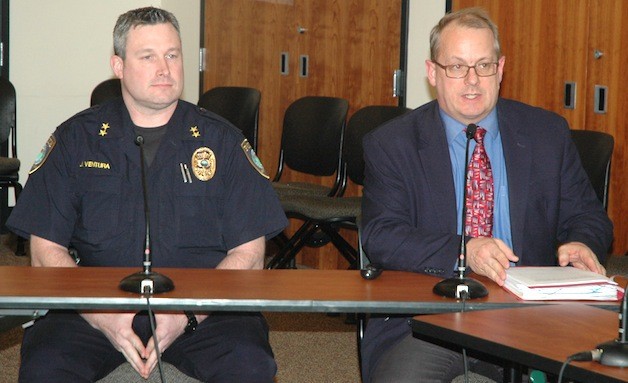ARLINGTON — An apparent miscommunication between the city and the American Civil Liberties Union could have resulted in recently passed anti-solicitation laws being revised in ways that no one wanted, including the allowance of exploitation of children.
After the city adopted the regulations last July to give police the tools to deal with aggressive solicitation, the ACLU contacted the city in December to object to some of those measures.
“We looked at case law for other cities and found the courts were protective of individual solicitation,” city attorney Steve Peiffle said. “The ACLU was focused on the issue of solicitation language, as opposed to solicitation action. The courts have said that restrictions on solicitation language have to be very narrowly construed. Regulations of freedom of speech have to be content-neutral.”
Peiffle consulted with Arlington Deputy Police Chief Jonathan Ventura, and corresponded with Nancy Talner, staff attorney for the ACLU of Washington state, to revise the anti-solicitation guidelines according to the ACLU’s requests. This has included removing restrictions on solicitation based on the time of day and location, but those weren’t the most controversial revisions at the City Council’s March 23 workshop.
Deborah Nelson and Randy Tendering echoed the sentiments of council member Jan Schuette, who objected to removal of restrictions on solicitation involving 1) false or misleading representation, 2) the exploitation of children or 3) while under the influence.
“Most of the other changes, I can live with, but the removal of those three restrictions really offends me,” Schuette told The Arlington Times March 24. “I’m totally for free speech, but why would we allow solicitation that exploits children?”
During both the workshop and her interview, Schuette said she couldn’t justify fighting the ACLU, given its overwhelming track record in court. However, she wanted citizens to know what restrictions would be taken out of the anti-solicitation laws as a result, especially with a public hearing on the subject coming up Monday, April 6.
“Steve Peiffle has talked to other cities about this,” Schuette said. “Several other cities have gotten a hold of us, and are watching us to see how they should respond.”
During separate interviews March 25, Peiffle and Talner agreed that the restriction on false or misleading representation in solicitation presented difficulties in enforcement, citing an example of someone asking for money for food, then spending it on gas or medicine instead.
However, while Peiffle had removed the other two restrictions Schuette cited to comply with the ACLU concerns, Talner couldn’t recall the ACLU actually requesting those removals.
“We didn’t ask him to take those items out,” Talner said.
When contacted later that day, and informed of Talner’s response, Peiffle replied: “Maybe, if they don’t have a problem with those restrictions, we can put them back in.”
Peiffle acknowledged that he and Talner needed to correspond further on this matter.







